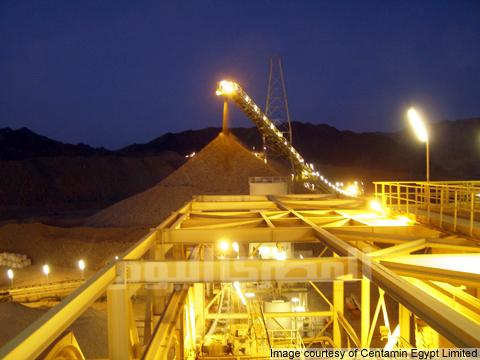
Centamin Plc, which runs Egypt's only commercial gold mine, said it would not bid in the country's new gold exploration tender because the terms are not commercially viable.
Egypt, which is hoping that gold production can be a future source of growth for its struggling economy, began accepting bids last week for five concessions in its first tender for new gold exploration since 2009. The deadline for bids is April 20.
Centamin, which last year produced 551,036 ounces from its Sukari mine in Egypt, said the terms were less attractive than previous rounds.
"Whilst Egypt contains many areas that are highly prospective for gold, Centamin will not bid for further ground under the latest terms proposed by EMRA [Egypt's mining agency] in the 2017 bid round," Centamin chairperson Josef el-Raghy told Reuters.
The bid round's terms have not been made public but were seen by Reuters.
They include a 6 percent royalty payment, an at least 50 percent production share, partial cost recovery before the start of production sharing, and three bonus payments to EMRA, including one of at least US$1 million.
"The proposed 6 percent royalty rate… is one of the highest globally… Furthermore, the onerous production-sharing terms, the partial cost recovery and the various bonuses due to EMRA create a non-commercial operating environment for any mining investor," Raghy said.
"Combined, the proposed terms result in an effective tax rate that is by far one of the highest for mining globally."
Mining companies have long called for Egypt to abandon its production-sharing agreement model, which has garnered little interest in past bid rounds, in favor of a more streamlined royalty and tax regime common in mining jurisdictions worldwide.
Centamin said it stands ready to reinvest if a modern mining law is introduced.
"Egypt needs a modern and competitive mining law and then there will be many mines like Sukari, which was created after over $1bn of investment and now employs directly and indirectly approximately 5,000 people," Raghi said.
"This bid round should be canceled otherwise ground will be held by small companies for many years with no significant investment as was the case with all areas offered in 2006 and 2008."
Small so-called junior exploration companies say they are the risk-takers most likely to open up gold mining in Egypt for further investment following their discoveries.
But they also echo Centamin's concerns that Egypt's terms need revising to bring them into line with more competitive mining jurisdictions.
David Hall, CEO of Thani Stratex Resources, which holds a concession in Egypt, said small miners are key to opening up the sector. But he also said companies like Thani Stratex were unlikely to justify spending handfuls of their limited cash on EMRA's high fees.
"It’s all risk and no guarantee of success, so you have to make favorable terms for an exploration company that is taking the risk and may end up with no formal discovery," he said.
EMRA said it expects high turnout for the latest tender based on early indications but did not provide further details.
"Egypt's potential will put it, in under 10 years, among the biggest producers of gold in the world based on our level of gold reserves and the studies and expertise we have," EMRA head Omar Teama told Reuters.




